Egypt's army ousts Morsi, who calls it a "coup"
Updated 11:44 PM ET
CAIRO Egypt's first democratically elected president was ousted Wednesday by the military after barely a year in office, felled by the same kind of popular revolt that first brought him to power in the Arab Spring.
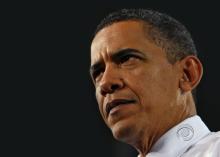
WH reaction muted to military takeover in Egypt
The armed forces announced it would install a temporary civilian government to replace Islamist President Mohammed Morsi, who denounced the action as a "full coup" by the generals. They also suspended the Islamist-drafted constitution and called for new elections.
Millions of anti-Morsi protesters in cities around the country erupted in delirious scenes of joy after the televised announcement by the army chief. Fireworks burst over crowds in Cairo's Tahrir Square, where men and women danced, shouting, "God is great" and "Long live Egypt."
"Don't ask me if I am happy, just look around you at all those people, young and old, they are all happy," said 25-year-old protester Mohammed Nageh, shouting to heard at Tahrir.
"For the first time, people have really won their liberty."
- State Dept. orders diplomats to leave Egypt
- Military tightens grip as Egypt remains on edge
- Egyptian factions entrench ahead of military deadline
- What do Egyptian protesters want, and what's the military's role?
- Egypt protesters ransack Muslim Brotherhood headquarters
"I don't think anyone here wants the army to come back and govern the country," a man on a street told CBS News. "So I think all the cheering and all the excitement is because it's seem like the army is saying to the people "we're with you, we're protecting you and we realize how serious this is."
Reporting from Cairo, CBS News correspondent Clarissa Ward reported that the people on the streets don't have one leader in mind who should take over. But they say finding a new leader is tomorrow's problem.
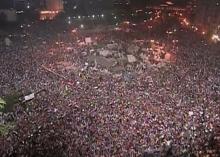
Morsi Out, Cairo crowd celebrates
Fearing a violent reaction by Morsi's Islamist supporters, troops and armored vehicles deployed in the streets of Cairo and elsewhere, surrounding Islamist rallies. Clashes erupted in several provincial cities when Islamists opened fire on police, with at least nine people killed, security officials said.
Gehad el-Haddad, a spokesman for the Muslim Brotherhood party, said Morsi was under house arrest at a Presidential Guard facility where he had been residing, and 12 presidential aides also were under house arrest.
The army took control of state media and blacked out TV stations operated by the Muslim Brotherhood. The head of the Brotherhood's political wing was arrested.
The ouster of Morsi throws Egypt on an uncertain course, with a danger of further confrontation. It came after four days of mass demonstrations even larger than those of the 2011 Arab Spring that toppled longtime autocrat Hosni Mubarak.
Egyptians were angered that Morsi was giving too much power to his Muslim Brotherhood and other Islamists and had failed to tackle the country's mounting economic woes.
Beyond the fears over violence, some protesters are concerned whether an army-installed administration can lead to real democracy.
In Washington, President Barack Obama urged Egypt's military to "move quickly" to return authority to an elected civilian government. He said he was ordering the U.S. government to assess what the military's actions meant for U.S. foreign aid to Egypt — $1.5 billion a year in military and economic assistance.
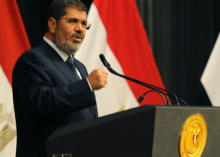
Death toll climbs amid turmoil in Egypt
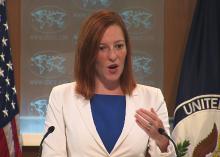
U.S. "not taking sides" in Egypt unrest, official says
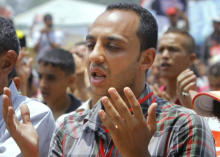
Morsi refuses to step down despite deadline
In conversations, senior Egyptian military officers assured U.S. Defense Secretary Chuck Hagel and Gen. Martin Dempsey, chairman of the Joint Chiefs of Staff,they would put a civilian government in place quickly, U.S. officials said. They spoke on condition of anonymity because they were not authorized to speak by name about the private conversations.
Moments after military chief Gen. Abdel-Fattah el-Sissi spoke, Morsi said in a statement on the Egyptian president's office's Twitter account that the military's measures "represent a full coup categorically rejected by all the free men of our nation," while urging "everyone to adhere to peacefulness and avoid shedding blood of fellow countrymen."
Morsi has insisted his legitimacy as an elected president must not be violated or Egypt could be thrown in to violence. Some of his Islamist backers, tens of thousands of whom took to the streets in recent days, have vowed to fight to the end — to defend both the legitimacy of the vote and their ambitions to bring Islamist rule to Egypt.
"Down with military rule. Revolution, Islamic revolution, against el-Sissi and the thugs," the crowd of thousands chanted at the main pro-Morsi rally in Cairo after the army announcement.
The army has insisted it is not carrying out a coup, but acting on the will of the people to clear the way for a new leadership.
In his speech, Gen. el-Sissi said the chief justice of the Supreme Constitutional Court, Adly Mansour, would step in as interim president until new elections are held. A government of technocrats would be formed with "full powers" to run the country.
Mansour, who was appointed to the court by Mubarak but elevated to the chief justice post by Morsi, will be sworn in on Thursday by judges of his court.
El-Sissi, the defense minister appointed by Morsi, promised "not to exclude anyone or any movement" from further steps. But he did not define the length of the transition period or when presidential elections would be held. He also did not mention any role for the military.
© 2013 CBS Interactive Inc. All Rights Reserved.
http://www.cbsnews.com/8301-202_162-57592271/egypts-army-ousts-morsi-who-calls-it-a-coup/
